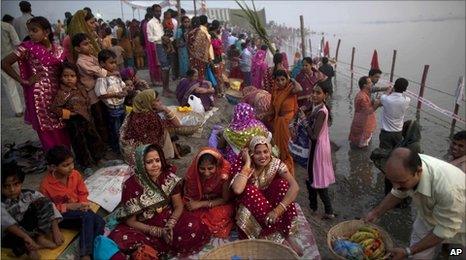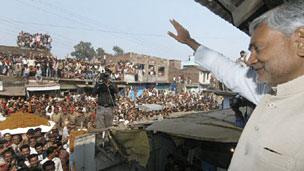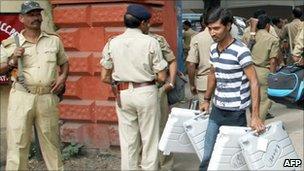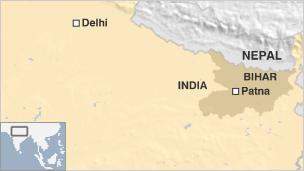India's Bihar state begins to shed its 'badlands' image
- Published

Much has changed in the past five years in Bihar
As voting comes to an end in long drawn-out, multi-phase elections in Bihar on Saturday, it seems the Indian state is beginning to shed its reputation for lawlessness, caste violence and banditry.
While voters determine who will inhabit the 243-member provincial assembly, these issues - including the muscle and money power of the candidates - have been subordinated.
The main question now is how the state government can function more effectively and provide better governance.
It is such a change from the last time I visited Bihar five years ago, again in the thick of electioneering.
Then, Bihar began where the rule of law ended. The only industry which thrived in the badlands of the state was crime.

Mr Kumar is seeking a second term
Kidnapping, carjacking and extortion were rampant, and Bihar's fertile soil had turned into killing fields with bloody caste wars erupting with destructive regularity.
With most criminal activity being traced back to the state's powerful elite, the morale of the bureaucracy, particularly the police, was low and not many dared to venture out after sunset - even in the capital city, Patna.
Words like governance and development had gone out of the local lexicon.
There were stretches of road between pot holes and it was rare to have a government school which had students, teachers and a building. Usually at least one of these three would be missing.
Enlightenment
Bihar was not always like that.
It once represented the best and the brightest of India, offering a rare mix of the sublime, the spiritual and the earthly.
It was here that Buddha was said to have attained enlightenment.
Nalanda university, now in ruins, was once the most sought-after seat of learning.
And the mighty empires which sprang up here in ancient times earned India the sobriquet of the Golden Bird.
Not everything good about Bihar was ancient.

The last stage of Bihar's lengthy election campaign takes place on Saturday
Bihar was in the forefront of India's freedom struggle and Mahatma Gandhi launched some of his early campaigns against British colonial rule from the state.
It also led the way in opposing the imposition of a state of emergency by the then-Prime Minister Indira Gandhi which resulted in the first defeat of the Congress party in national elections in 1977.
On issues like social justice and affirmative action, Bihar has been a trailblazer in post-independent India.
Bihar began to slip about 20 years ago. Not long ago The Economist described it as a place which "everybody avoided visiting, and dreaded becoming".
'On the move'
According to Professor Arun Kumar Sinha of Patna University, Bihar's freefall has been halted over the last five years.
"The rule of law has been restored. People feel safe and the development which has taken place is for all to see."
Swaminathan Aiyar, one of India's best known commentators on economic affairs, concurs.
"Bihar is on the move," he says.
"It still has a lot of catching up to do with other more advanced states like Maharashtra and Gujarat - in attracting industry and investments - but Bihar is moving in the right direction."
In a record of sorts, Bihar has clocked a double-digit growth rate every year over the past five years.
Property prices all across urban Bihar have rocketed and pristine new shopping malls and highrise apartment blocks are springing up - not just in Patna but also in some of the tier-two towns of the state.
But the biggest game-changer is the condition of the roads.
They may not have become as smooth as the cheeks of a famous Bollywood queen of yesteryear - as former Chief Minister Laloo Prasad Yadav famously promised.
But there is nevertheless a considerable improvement. Five years ago a 250km (155-mile) journey took 12 hours.
Now, a comparable journey - from Patna to Bhagalpur - took us less than seven hours.

It is this story of change and development which Chief Minister Nitish Kumar is trying to sell as he addresses more than half-a-dozen election meetings every day.
He talks about how he has succeeded in ensuring that more girls enrol in schools.
"I have given free bicycles to more than 400,000 girls as an incentive for going to school. I will more than double this number if elected again," he pledges.
As the crowds cheer him on, he adds: "Bring me back and there will be a bicycle for every boy as well."
He then talks about the need to produce more power in Bihar if the state wants to attract more industry.
It is a measure of Nitish Kumar's success that his political opponents are being forced to speak the language of development in their election meetings.
So his principal adversary, Laloo Prasad Yadav, talks about the train coach factory he sanctioned during his tenure as the federal railways minister, which has given jobs to 50,000 people.
Even Rahul Gandhi, the Congress party's star campaigner, has been forced to challenge the Nitish Kumar development story in public meetings.
"If Bihar is indeed doing so well why would millions be going out of the state looking for work?"
The opposition has a point.
Nobody can argue that Bihar has fully turned the corner despite the improvements.
But what is heartening is that all those competing for public office are now debating governance, development and bread-and-butter issues rather than focusing on emotive sloganeering and caste considerations.
- Published21 October 2010
- Published20 October 2010